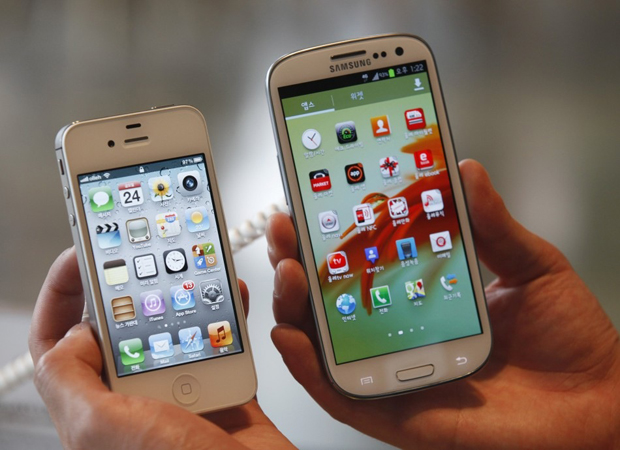
WHO COPIED WHO? Giant manufacturers Samsung and Apple filed lawsuits against each other for alleged violations of intellectual property rights over their smartphones, the iPhone and the Galaxy, respectively. Photo from MSNBC.
MORE THAN half of all handsets will be smartphones in 2013, read a headline from Ars Technica last August 29and around half of these are Apple and Samsung devices. What do the products of these two companies have in common that is causing such a fuss in the mobile telecommunications industry?
The past year has shown that there is no easy answer to that question.
Scorched earth warfare
On April 15, 2011, Apple Inc. filed its first complaint against Samsung Electronics in a US federal court, accusing several of the latters devices for infringement of Apples utility and design patents. A week later, Samsung countersued Apple in Seoul, Tokyo and Mannheim on grounds of intellectual property infringement, like those of its wireless data transferring.
Today, more than a year later, two of the worlds largest tech giants are still entangled in more than thirty lawsuits spanning four continents.
A landslide verdict for Apple last August 24 in California marked its first big victory, leaving Samsung reeling with a $1.05 billion fine and injunctions on the Samsung Galaxy Nexus and Galaxy Tab 10.1. The jury found that 28 Samsung smartphones unfairly lifted ideas, like the finger controls, bounce-back and tap-to-zoom features and the overall hardware and interface design originating from the iPhone.
Meanwhile, halfway around the globe in Japan, the Tokyo district court rejected patent claims made by Apple against Samsung Galaxys media synchronization between devices and servers, while Samsung also sued Apple on several grounds of patent infringements. In South Korea, where Samsung is based, a judge handed down a split decision calling for mutual compensation for the alleged damages the two companies caused on each other.
Different offerings
While the manufacturers battle it out over the tiniest of details, at the end of the day, the average consumer is more concerned about the tangible things beneath their fingertips.
Senior management engineering major and iPhone user Paolo Chua says that what elevates the iPhone from the market is the Apple Ecosystem, which includes iTunes and the App Store. One thing about smartphones is that [they are] portable, yet on the other hand, they wont stand on their own for the average computer user, he said. For him, Apple has left virtually no spot unchecked in allowing across-the-board device integration, especially for users of both iOS (the operating system of portable Apple devices such as the iPhone, iPad and iPod touch) and OS X (Apples line of operating systems for MacBook and iMac devices).
On the other hand, senior management economics major Shaun Si argued that Apples holistic approach has a tendency to limit the consumer. One of the biggest advantages of Android is that its more flexible. Apple traps you in its ecosystem and forces you to be limited, he said. Android is Googles hugely popular mobile operating system used by Samsung in its Galaxy devices.
Little perks, like being able to adjust the resolution of photos or change the app icons, have been made possible by Android and they go a long way for the more tech savvy consumers.
Taking flexibility one step further, Samsung has received acclaim as the worlds biggest smartphone seller also thanks to the variety of models it offers. As opposed to the iPhone as Apples sole chef-doeuvre, Samsung spans the whole range of income demographics with over twenty-two models of smartphones.
Legal implications
The iPhone 5, which Apple tags as the biggest thing to happen to iPhone since iPhone, was launched last September 12 and was instantly juxtaposed with the Galaxy S III, which Samsung touts to be designed for humans, all over the world wide web.
The whole thing with Apple and Samsung just shows that ideas are sacredthey can be protected in the court of law, so people should fight if they feel like their creation has been compromised or copied, said lawyer John Aguas from the Marketing and Law Department.



